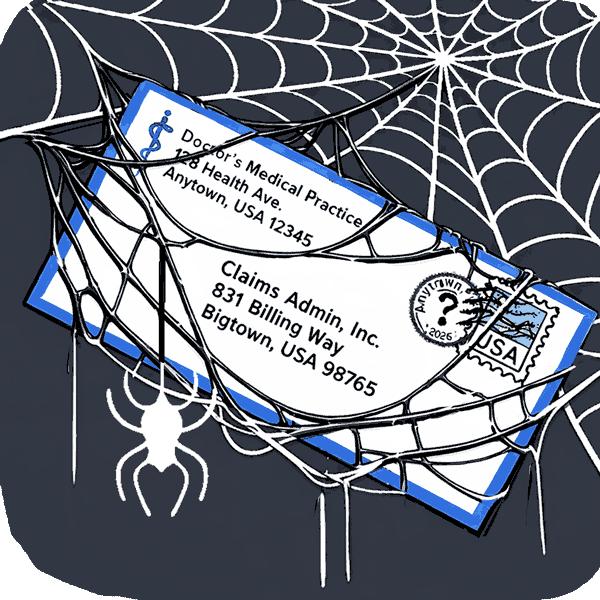No Response? How to Deal with Ignored Bills

It happens far too often: providers treat an injured worker for a California employer, send the bill to the claims administrator, and then...nothing.
Workers’ comp is frustrating enough, but few things are more irritating than hearing crickets in response to a compliant original bill. Fortunately, California law offers remedies. Here’s how to obtain reimbursement (and address blatant non-compliance) when the claims administrator fails to respond to your bill.
Rules for Responding to Workers’ Comp Bills
When responding to providers’ bills, California claims administrators must abide by the law as established by the Labor Code.
Depending on the mode of bill submission (i.e electronic or non-electronic), the Labor Code dictates the timeframes for claims administrators to respond and issue payment:
Response |
Electronic Bill |
Non-Electronic Bill |
Issue an EOR contesting or denying the bill, or reject bill as incomplete |
15 days from receipt of the bill |
30 days from receipt of the bill |
Remit payment |
15 days from receipt of the bill |
45 days from receipt of the bill (60 days if the payor is a government entity) |
When a claims administrator fails to respond to a bill within the above-noted deadlines, the claims administrator is non-compliant. At that point, the provider’s staff must take action to obtain reimbursement, along with any applicable penalties and interest.
How to Address Non-Response
In the event the claims administrator remits no response to an original bill, providers should take the following actions:
1. Contact the Claims Administrator
Inform the claims administrator that your office sent a complete, compliant bill with supporting documentation and received no response. Remind claims that your office has verifiable proof of receipt.
For non-electronic bills, a record of a successful fax transmission stands as proof of bill receipt. For electronic bills, the DWC requires claims administrators to send an acknowledgment of receipt of an electronic bill within 2 days.
2. Submit a Duplicate Bill
Providers may submit a duplicate bill when the claims administrator fails to respond to an original bill. Importantly, duplicate bills may not include any revisions or additions, and providers may not submit duplicate bills after receiving the Explanation of Review (EOR).
The duplicate bill must be exactly the same as the original bill, with two exceptions:
- The billing date must reflect the date of the duplicate submission, not the original bill date.
-
The duplicate bill must be marked as a duplicate bill in accordance with DWC rules. Section 5.0(a) of the Medical Billing and Payment Guide describes the requirements for non-electronic bills, while the Electronic Medical Billing and Payment Companion Guide Section 2.11.2 describes the requirements for electronic bills.
Importantly, submitting a duplicate bill does not “reset the clock” for the claims administrator; payment is still due for the original bill by the applicable deadline.
3. Submit an Audit Complaint to the DWC (Optional)
Audit complaints* are anonymous alerts to the DWC that trigger an investigation by the DWC Enforcement Unit. Informing the claims administrator of an audit complaint is entirely optional on the provider’s part — though we have seen cases in which the claims administrator quickly remitted payment upon being informed of a complaint.
Audit complaints may not necessarily result in an Enforcement Unit investigation or proper reimbursement. Sadly, the DWC isn’t quite forthcoming with information on the status of a complaint or investigation. However, every audit complaint helps the DWC gather important data on patterns of noncompliance by claims administrators.
Collect Penalties and Interest
Labor Code Section 4603.2 mandates a 15% penalty and 10% accrued interest per annum for late payment of electronic and non-electronic original medical bills after 45 days (60 days for government employers). For medical-legal bills, payment after 60 days (government and non-government employers) incurs penalty and interest of 10% and 7% per annum, respectively.
Be aware that these penalties are “self-executing.” If the claims administrator ultimately pays untimely and does not include penalties and interest, the provider may file a lien.
Failure to respond to a complete bill is unacceptable. Insist on compliance, insist on correct reimbursement, and take action when necessary. For more, see our FAQ.
*NOTE: The Audit Complaint form was updated in 2019. Access the updated form here: https://www.dir.ca.gov/dwc/Auditref.pdf
DaisyBill makes protecting your office’s revenue easy, with instant Audit Complaint and Second Review tools right at your fingertips. Schedule a free demonstration, and see how much easier workers’ comp can be.
REQUEST DEMO
DaisyBill provides content as an insightful service to its readers and clients. It does not offer legal advice and cannot guarantee the accuracy or suitability of its content for a particular purpose.



